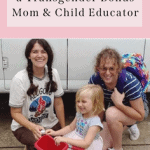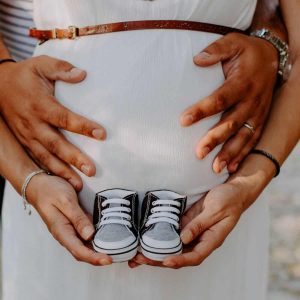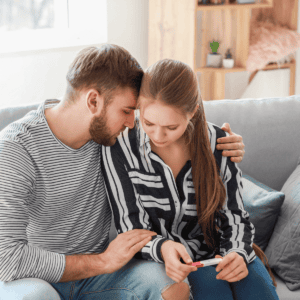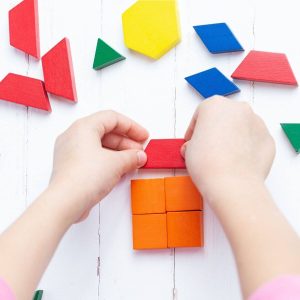I met Thea on a sunny day in early autumn. She and her friend Nicole run a small, independent school, and they gave me a private tour of their classrooms. Before I knew her as a bonus mom, Thea was my son’s teacher.
With bright eyes and a mischievous smile, I quickly fell in love with Thea’s wacky jokes and her easy-going nature.
She’s the type of person you immediately want to be friends with, although you will wonder if you can keep up with her lightning fast wit. She has the humble confidence of a woman who has experienced some of the best and worst of life’s offerings.
Outside of school, Thea has the unique privilege of co-parenting Nicole’s daughter Evey, a thoughtful but fierce little blur of bare feet and blonde hair.
Thea moved in with Evey and Evey’s parents several years ago as a roommate. What started out as a working relationship and friendship with Evey’s parents has blossomed into a unique and inspiring partnership in co-parenting.
Since then, Thea has slowly become a central figure in Evey’s life. From potty learning to meals to playtime, she does it all. She does it well.
Thea is also a trans woman. With so few transgender parenting role models available, Thea is actively shaping and defining what it means to be a trans co-parent.
Her gifts as a caregiver and educator are not universally accepted or appreciated. She is undertaking not only the challenges of parenting, but also the challenges of navigating a world where her perspective and experiences are often invalidated or dismissed.
At Undefining Motherhood, it is our mission to celebrate the many ways that women experience motherhood, and we are honored to share this interview with Thea in the hope it will inspire and affirm other trans moms and bonus mothers.

This site contains affiliate links, meaning that we earn a small commission for purchases made through our site. We only recommend products we personally use, love, or have thoroughly vetted.
- Origins Of A Bonus Mom: Helping Kids Connect With Their Curiosity In The Classroom
- 1. Thea, Let’s start off with a classic interview question. Tell us a little bit about yourself.
- 2. Your perspective as an educator is unique. In your school, you use a self-directed model of education. It’s very different from the type of teaching you find in most schools. Can you tell us more about that?
- 3. What drew you to the field of education in the first place and what does your career look like now?
- 4. If you’re comfortable, please share with us a little about your experience growing up transgender and how that shaped your career path?
- Origins Of A Bonus Mom: Teaching And Parenting Without A Road Map
- A Closer Look At Motherhood, Mothering, And The Role Of A Bonus Mom
- The Joy and The Uncertainty of Being a Bonus Mom
- Thanks for sitting down to speak with us mom-to-mom, Thea!
Origins Of A Bonus Mom: Helping Kids Connect With Their Curiosity In The Classroom
1. Thea, Let’s start off with a classic interview question. Tell us a little bit about yourself.
I usually tell people I’m a zany cartoonist whom everyone loves. I am also a teacher and a co-parent.
2. Your perspective as an educator is unique. In your school, you use a self-directed model of education. It’s very different from the type of teaching you find in most schools. Can you tell us more about that?
So I work at an Agile Learning Center, which is in the vein of self-directed education. I like the ALC model because there’s self-directed opportunities for our students to pursue their passions and interests.
There is also structure that helps them be intentional with their time when they want to be intentional with their time.
Basically, kids show up and we have a meeting in the morning where we set the day. They may say they want to lay around all day, play softball, do a math worksheet, climb a tree, do a science project, or read a book. They can also choose from different teacher-facilitated offerings.
It’s my belief and experience that if you leave humans alone to do what they want to do, they are going to learn.
[Author’s Note: If you’re brand new to self-directed education, the progressive approach used in Montessori for infants is a great first step.]
3. What drew you to the field of education in the first place and what does your career look like now?
Well, to pay for my Masters in Arts, I worked as a graduate assistant teaching freshman year writing classes. In particular, I taught pedagogy classes [Pedagogy is just a fancy term for teaching method!]
In creative writing pedagogy, it’s very self-directed. You can’t tell someone how to write the poem that they’re supposed to write. I was holding space for my students to explore their own writing.
After that, I started working at a summer camp with high school students, and I realized, oh cool, high school students are way more into taking these artistic risks. It’s not as heavy for them to do that. They are also more playful.
Shortly after that, I started working as a high school teacher in Miami doing self-directed stuff, and eventually, came to teach here in Georgia.
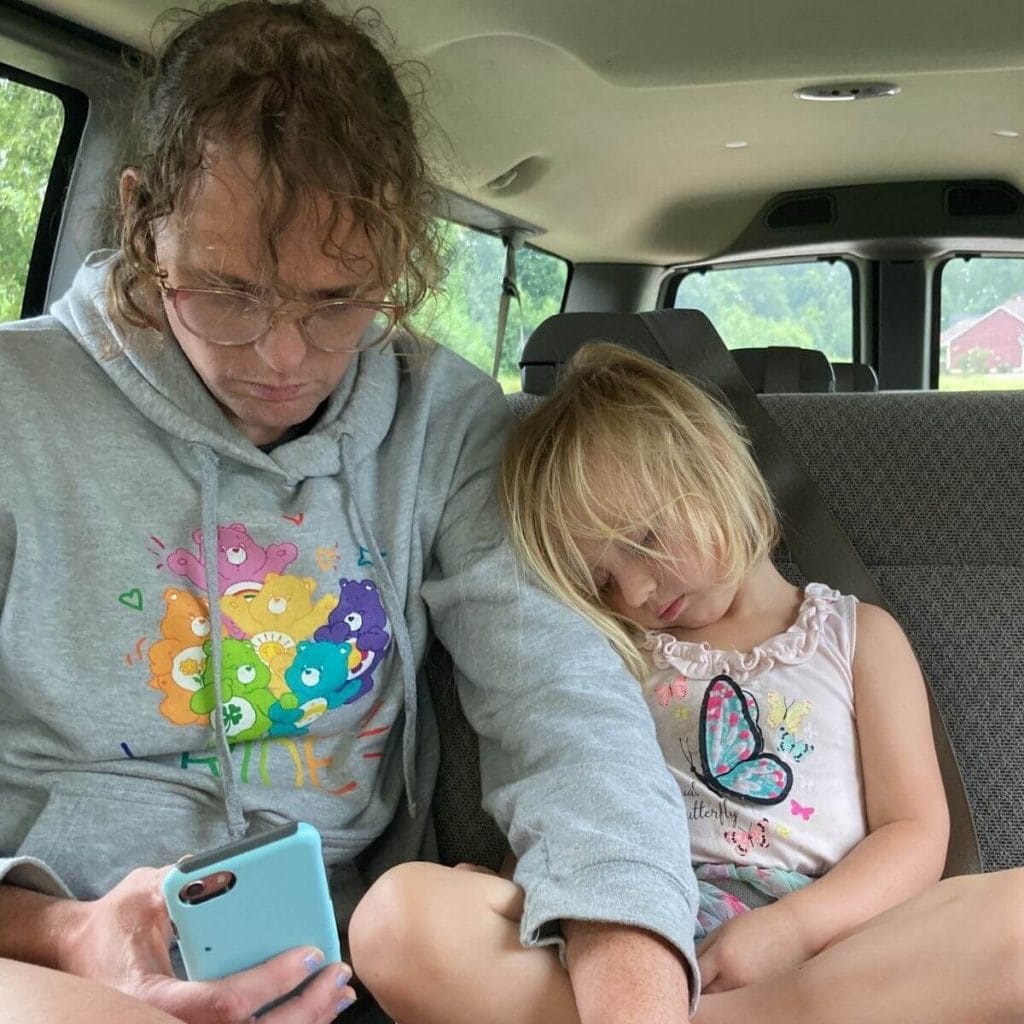
4. If you’re comfortable, please share with us a little about your experience growing up transgender and how that shaped your career path?
I come from a Catholic family that is very, what’s the word,…controlling. As a little kid, I recall having this realization that you can have your mind, and in your mind you can always do whatever you want.
But then you also have the world. The world is always going to put you into things you don’t care about or don’t want to do.
I remember actively repressing my feelings at that time. Not like in the movies repressing where you suddenly discover them but saying, ok, that’s how I feel. We’re not going to lean into that.
I did not know I could ever live in the world authentically; I still thought that I was a boy who wanted to be a girl. Basically, I had not made the mental shift to know I was a girl who had to pretend to be a boy.
It was not until I joined my Masters program that I started to meet other students who were into things that I had always secretly been into.
I think my call to pursue creative writing was the flicker inside me that somehow knew I needed to do this. To get to the people who would allow me to love the rest of me.
I was talking to people about the emotional well-being of children and how that should be part of teaching. That people with creative voices are important. Authenticity. I thought, wait, we can actually say that these things matter?
It was then I knew I could make the world into one where I could be free.
Reflecting upon this later in therapy, I realized that the reason I became a teacher is because I am obsessed with giving children something I could not give myself and did not have. Which is a voice and a space to be authentically yourself.
Origins Of A Bonus Mom: Teaching And Parenting Without A Road Map
1. I know you are passionate about working with children. Did you ever envision yourself as a parent as well? What was it like entering into parenthood as a trans woman?
I’ve always wanted to be a parent, and I guess I never had a clear picture of what that would be.
There is this concept of queer temporality where sometimes queer people feel behind their cis and hetero peers. The life timeline (first job, get married, have kids, etc.) is built for cis and hetero people. When are you supposed to develop your body as a trans person? A lot of trans people do those things not in the “right” order, including parenting.
There is also this concept I call “queer freedom.” When we watch movies as a kid, we think, well what are my friendships supposed to look like? As a trans person, there is not a lot of media that tells me how to be friends with people.
I have to and get to authentically create my relationships with people.
It’s the same freedom that led to my co-parenting relationship with Nicole and my relationship as a parent with Evey. It’s what it needs to be to have everyone’s needs met in the best way.
2. What’s your favorite part about working with children?
Like I mentioned, I am still recognizing and understanding my childhood trauma of being constantly told that how I think about the world is wrong. I have this thought process that if someone is telling me something, it’s probably more in line with reality than my own perceptions.
This is actually a wonderful tendency to have if you’re working with kids.
For example, if I am looking at a blue sky with one of my students and they ask, “Why is that sky orange?” I think people’s instincts are to say, no, that’s blue, but I immediately try to figure out how it’s orange.
Kids are masters at asking questions that subvert the accepted narratives of things like social constructs. Instead of correcting them, I enjoy helping them explore their ideas and creating a world with them where they can examine their assumptions and ultimately their own beliefs.
A Closer Look At Motherhood, Mothering, And The Role Of A Bonus Mom
1. Do you consider yourself a mother? How would you define motherhood?
I have a sensitivity around motherhood in general. My mother was physically violent and not emotionally present in a lot of ways. I have a fraught relationship with motherhood, which makes me hesitant to want to take the role of a mother.
I see motherhood as sacred between mothers and children. Nicole, Evey’s mom, talks about a lineage of motherhood being passed down to her…she can look back to her mother, grandmother, great grandmother back and back. I am not part of that line.
I also feel like if I took the role of a “mother” in Evey’s life, I might be missing some of the advantages I have to support Evey in different ways. My role can be defined by the needs of the people in the family instead of by cultural norms. I haven’t taken on the word “mother,” so I can continue with that freedom.
I do act motherly towards Evey; I do the actions of a mother, but Evey doesn’t call me any names related to motherhood. For her, I feel that is a good thing as she can experience a wider range of love and relationships. The title of mother doesn’t mean I love Evey more.
Sometimes I joke that I am the “trans woman who lives in her play nook” but that’s doesn’t describe all that I do for Evey.
For example, if Evey thinks there are ghosts in her room, her mother Nicole is going to say, “No, there aren’t ghosts or monsters.” She has the role of a protector and comforter, but my role, more often, is to help Evey go into the narrative she is creating (within reason.)
I can often show Evey ways to self-soothe by modeling in a way that her mother couldn’t. Evey says her mom is strong, her dad is strong, but she tells me, “Thea, you’re not strong.” I can be on Evey’s level, but she can still have the security and safety of her all-knowing and all-protecting parents.
2. How did your relationship with Evey’s mother Nicole develop, and what are some of the benefits/difficulties in being a bonus mother alongside a biological mom and dad?
Our friendship is actually the most hard-won friendship I have ever experienced. The first year we were working together as co-teachers, we were trying to be friends but it was not working. We don’t see the world in the same way. We would have conversations, and we would both walk away like what was anyone talking about?
A big part of our breakthrough was accepting each other’s truths. Nicole is a visual thinker and I am not. Accepting that our communication styles are different was huge. I am a cartoonist, and if I can draw what I’m saying for her, she understands. I can see it click for her.
It took practice. When I’m trying to talk to her, it’s much easier now for me to see where barriers in our communication exist. We acknowledge it out loud. I think that’s a big part of it. My ego flares up when it’s not flowing easily between us, but that happens even in strong relationships. It’s okay to stop and reflect.
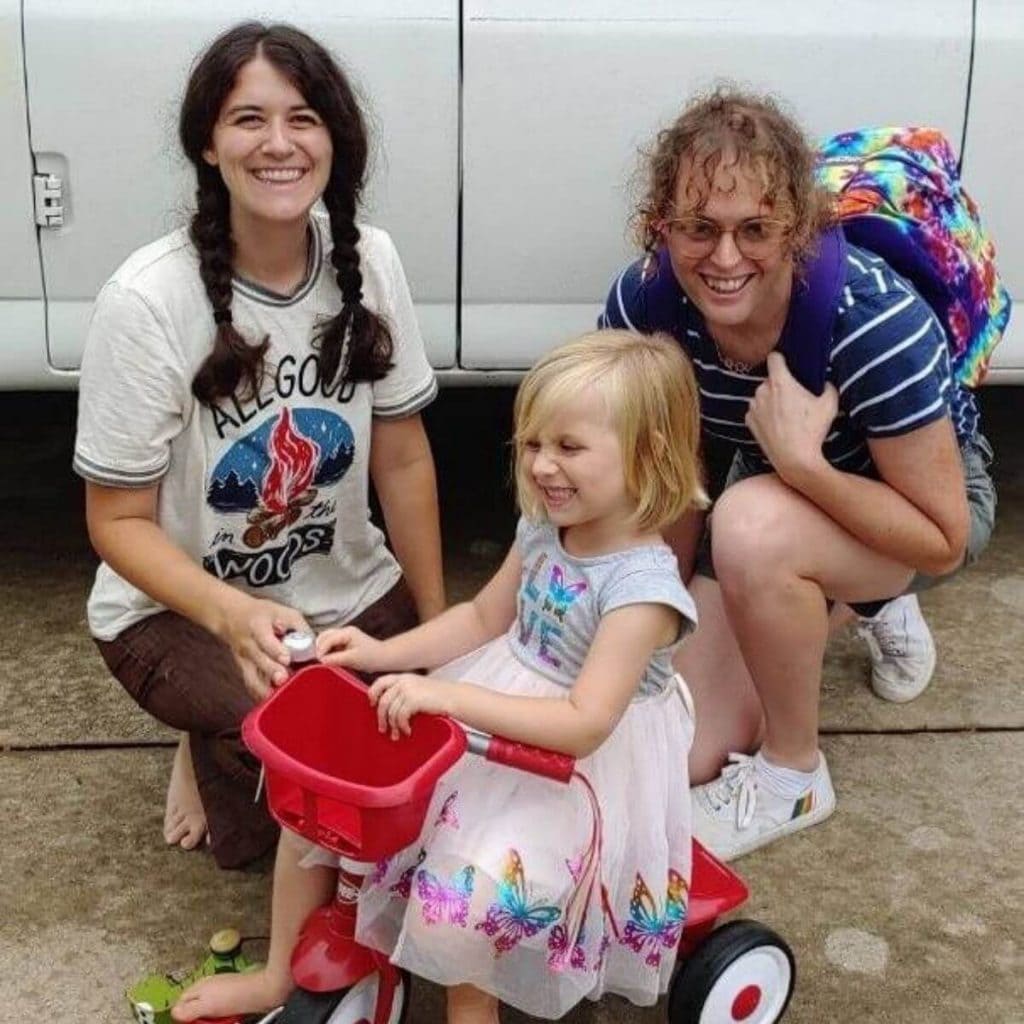
The Joy and The Uncertainty of Being a Bonus Mom
1. What do you love about being a co-parent to a toddler like Evey?
There is this support that I get to provide Nicole and Evey’s Dad. They may be in the process of making parenting decisions, and maybe they are too close to something to see a solution.
I can offer more opportunities for reflection, more ideas, more research. I love co-parenting with other intentional people who are trying to do the best they can. It’s collaborative.
I have an attention deficit disorder, so whenever I am with Evey I do my best to stay present and lean in. What’s great about co-parenting is we have the freedom to lean in, but we also have more freedom to tap out when we’re overstimulated or have other things we need to do.
One of the challenges of co-parenting, perhaps particularly as a third parent, is that sometimes I am told decisions around parenting rather than involved in making them.
I am not legally or biologically tied to Evey in any way. If something should happen, I have no say in Evey’s life. That is sometimes hard…I try not to think about it.
I wonder, what is my relationship with Evey ten years from now? I don’t know. I hope I stay in Evey’s life, but that is both at my discretion and at the discretion of her parents.
If we are separated one day, I do wonder if she looks back at this time…will she have a healthy, expanded understanding of gender? What will her opinion on trans rights be?
2. While it seems like you have a wonderful support system, I am sure there are challenges in being a trans co-parent. Can you speak to that?
There are places that I, as a trans person in Georgia, will not go. If we go out on an adventure, there are times where we end up in places that don’t feel safe to me.
Hate is real. People will come up to me and say hurtful things, threaten violence, and do hurtful things. Having Evey in my arms limits this in a way, I think, that should not be put on a kid.
I never want to put Evey in any sort of dangerous position. What if someone thinks I’m a danger to Evey because I’m trans?
Once we were on a field trip with some students. There were a couple of guys there who started threatening me, using slurs, and I had to leave. Luckily, I was there with other teachers, but what would have happened to my students if something happened to me?
I appreciate that Nicole believes me when I tell her, “This place does not feel safe.” Then we just don’t go there. In an ideal world, that wouldn’t have to happen.
Lack of Representation in the Media
One of the other challenges around co-parenting while trans is the lack of representation in the media. Evey watches things like Baby Shark and Daniel Tiger. All these shows, which are trying…well, I don’t think Baby Shark is trying very hard at all. I think that is the most normative thing I have ever seen.
A lot of times Evey asks about Moms and Dads. She has assumptions already at age three about who are the important people in a child’s life.
I also don’t know any trans women who are older than me and definitely not any who are mothers. While it’s freeing to be able to define my own mothering role, sometimes I think it would be more relaxing to have someone else who has done it all before. Someone I can turn to for answers.
Thanks for sitting down to speak with us mom-to-mom, Thea!
It takes a lot of bravery to open up about motherhood outside the mainstream and to bring focus to mothers who don’t match the stereotypical image of motherhood. We believe in the importance of highlighting bonus moms like Thea who are out there every day helping to raise wonderful kids. Thanks bonus moms, you rock!
Being a bonus mom is no easy task, and it comes with unique, often unacknowledged challenges. Do you have any bonus moms in your life? Share this article with friends and family to help us bring bonus moms into the parenting conversation.


